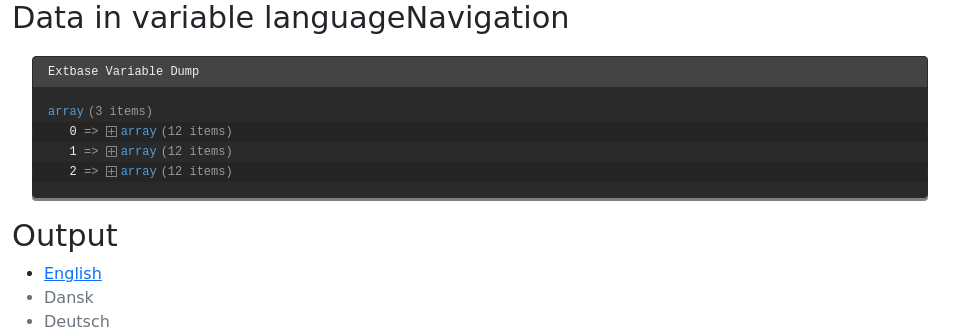language-menu data processor
New in version 12.1
One can use the alias
language- instead
of the fully-qualified class name
\TYPO3\.
The processor
\TYPO3\,
alias language-, generates a list of language menu items which can be
assigned to the
FLUIDTEMPLATE as a variable.
Table of contents
Hint
The third-party extension
b13/menus also provides
a language menu processor:
\B13\.
Refer to the manual of the extension b13/menus for more information.
Options:
| Name | Type | Default |
|---|---|---|
| if condition | ||
| string / stdWrap | "auto" | |
| string / stdWrap | "" | |
| string | defaults to the fieldName |
if
-
- Type
- if condition
- Required
- false
Only if the condition is met the data processor is executed.
languages
-
A list of comma-separated language IDs (e.g. 0,1,2) to use for the menu creation or
autoto load from the site configuration.
addQueryString.exclude
as
-
- Type
- string
- Required
- false
- Default
- defaults to the fieldName
The variable name to be used in the Fluid template.
Example: Menu of all language from site configuration
Please see also About the examples.
Using the
Language the following scenario is possible:
tt_content {
examples_dataproclang =< lib.contentElement
examples_dataproclang {
templateName = DataProcLangMenu
# Before TYPO3 v12.1 you have to specify the fully-qualified class name of the processor
# dataProcessing.10 = TYPO3\CMS\Frontend\DataProcessing\LanguageMenuProcessor
# Since TYPO3 v12.1 one can also use the available alias
dataProcessing.10 = language-menu
dataProcessing.10 {
languages = auto
as = languageNavigation
}
}
}This generated menu can be used in Fluid like this:
<html data-namespace-typo3-fluid="true" xmlns:f="http://typo3.org/ns/TYPO3/CMS/Fluid/ViewHelpers">
<h2>Data in variable languageNavigation</h2>
<f:debug inline="true">{languageNavigation}</f:debug>
<h2>Output</h2>
<f:if condition="{languageNavigation}">
<ul id="language" class="language-menu">
<f:for each="{languageNavigation}" as="item">
<li class="{f:if(condition: item.active, then: 'active')}
{f:if(condition: item.available, else: ' text-muted')}">
<f:if condition="{item.available}">
<f:then>
<a href="{item.link}" hreflang="{item.hreflang}"
title="{item.navigationTitle}">
<span>{item.navigationTitle}</span>
</a>
</f:then>
<f:else>
<span>{item.navigationTitle}</span>
</f:else>
</f:if>
</li>
</f:for>
</ul>
</f:if>
</html>The array now contains information on all languages as defined in the site
configuration. As the current page is not translated into German, the
German language has the
item. set to false. It therefore
does not get linked in the template.

